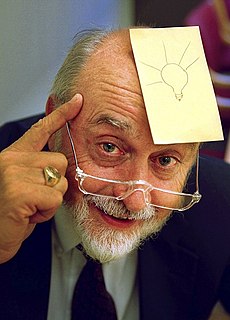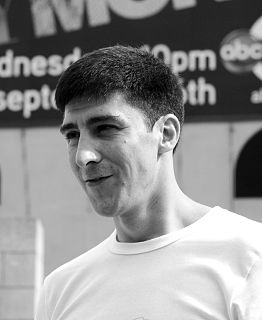A Quote by Arthur Fry
[Richard Drew] always encouraged his people to pursue ideas... He said, "If it's a dumb idea, you'll find out. You'll smack into that brick wall, then you'll stagger back and see another opportunity that you wouldn't have seen otherwise."
Related Quotes
In a word, learning is decontextualized. We break ideas down into tiny pieces that bear no relation to the whole. We give students a brick of information, followed by another brick, followed by another brick, until they are graduated, at which point we assume they have a house. What they have is a pile of bricks, and they don't have it for long.
You don’t try to build a wall, you don’t set out to build a wall. You don’t say ‘I’m going to build the biggest, baddest, greatest wall that’s ever been built.’ You don’t start there… You say ‘I’m going to lay this brick as perfectly as a brick can be laid.’ And you do that every single day and soon you have a wall.
Separate out the creative act from the act of editing and execution. Make it a two-step process. First, let ideas flow and encourage EVERY idea to make it to the whiteboard. Don't criticize, judge, edit, budget, or worry. An idea on the wall can't hurt anyone, so let them rip without restriction. After any and all ideas have the opportunity to "come out to play", only then should you apply your analytical and logical side to the effort. Don't mix the creative process with the editing process or you'll kill your ideas before they even get a fighting chance.
Dimension stone, flint, rubble, burnt or unburnt brick, use them as you find them. For it is not every neighborhood or particular locality that can have a wall built of burnt brick like that at Babylon, where there was plenty of asphalt to take the place of lime and sand, and yet possibly each may be provided with materials of equal usefulness so that out of them a faultless wall may be built to last forever.
When you feel that you are at the end of your path and there is a ten foot high brick wall right there in front of you, and you have nowhere to go but backwards, break down that wall and move forward. There are great and wonderful things on the other side of that wall... and, they have always been there. Let nothing divide you from what you need to do in life, and see the solutions that are right in front of you. The key is, you must break down what separates you from them and choose to find them.
When Christian pushes into the brick wall of the building catty-corner to the rear of BB&B—first left on the Dark Zone side—and disappears, I melt down in a fit of the giggles. I toss a rock at the spot where he vanished. It bounces off the brick and clatters to the cobblestone. I'm feeling twenty shades of Harry Potter's train station, especially when he pokes his head out of the wall and says impatiently, "Come on, lass. This is hardly my favorite place to be.
But Sam turned to Bywater, and so came back up the Hill, as day was ending once more. And he went on, and there was yellow light, and fire within; and the evening meal was ready, and he was expected. And Rose drew him in, and set him in his chair, and put little Elanor upon his lap. He drew a deep breath. ‘Well, I’m back,’ he said
At the time, I used to say, "We should market this like Everybody Loves Raymond. It's just a guy dealing with his family." Instead, it was irresistible to show all these funny people. So, I actually think this could be more inviting to a new audience because they can just watch one character, find out what's going on in his life, and then meet another character and find out what's going on in her life, and then see how it intersects the other one.
If you hear a good idea, capture it; write it down. Don't trust your memory. Then on a cold wintry evening, go back through your journal, the ideas that changed your life, the ideas that saved your marriage, the ideas that bailed you out of bankruptcy, the ideas that helped you become successful, the ideas that made you millions. What a good review-going back over the collection of ideas that you gathered over the years. So be a collector of good ideas for your business, for your relationships, for your future.





































